Movie Review – Kingdom Of Heaven (Director’s Cut)
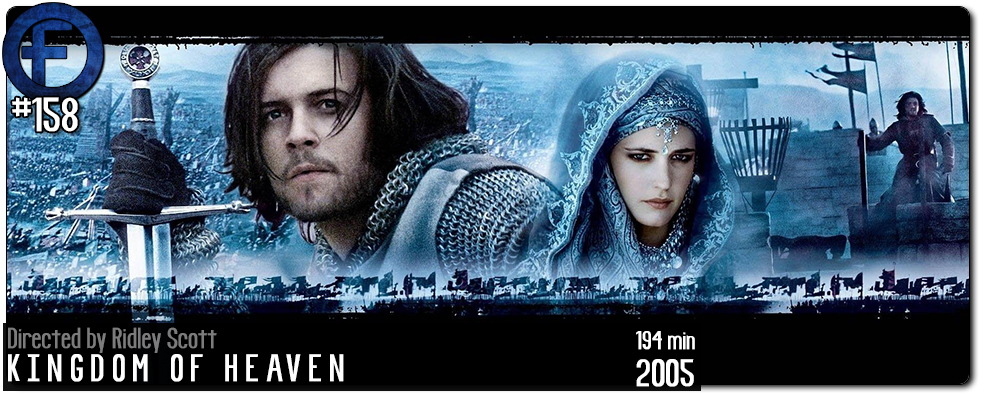
Cast : Orlando Bloom, Liam Neeson, Marton Csokas, Edward Norton, Brendan Gleeson, Jeremy Irons, David Thewlis, Ghassan Massoud, Khaled Al Nabawy, Alexander Siddig, Ulrich Thomsen, John Finch, Iain Glen, Eva Green, Kevin McKidd, Michael Sheen, Nikolaj Coster-Waldau, Michael Schaeffer, Martin Hancock, Nathalie Cox, Eriq Ebouaney, Jouko Ahola, Giannina Facio, Philip Glenister, Bronson Webb, Angus Wright.
Synopsis: A young man ventures to the Holy Land on a crusade to find absolution, and ends up leading the battle to defend Jerusalem against the approaching Muslim army.
********
Lavish, stylish, brutal retelling of a semi-fictional character’s journey to the Crusades in Jerusalem, Kingdom Of Heaven was lambasted (and rightly so) by critics upon it’s release into cinemas. However, with the advantage of DVD and the ability to re-edit the film in a Director’s Cut version, is this maligned film now more palatable to even the most jaded, hardened cine-phile? You bet it is!
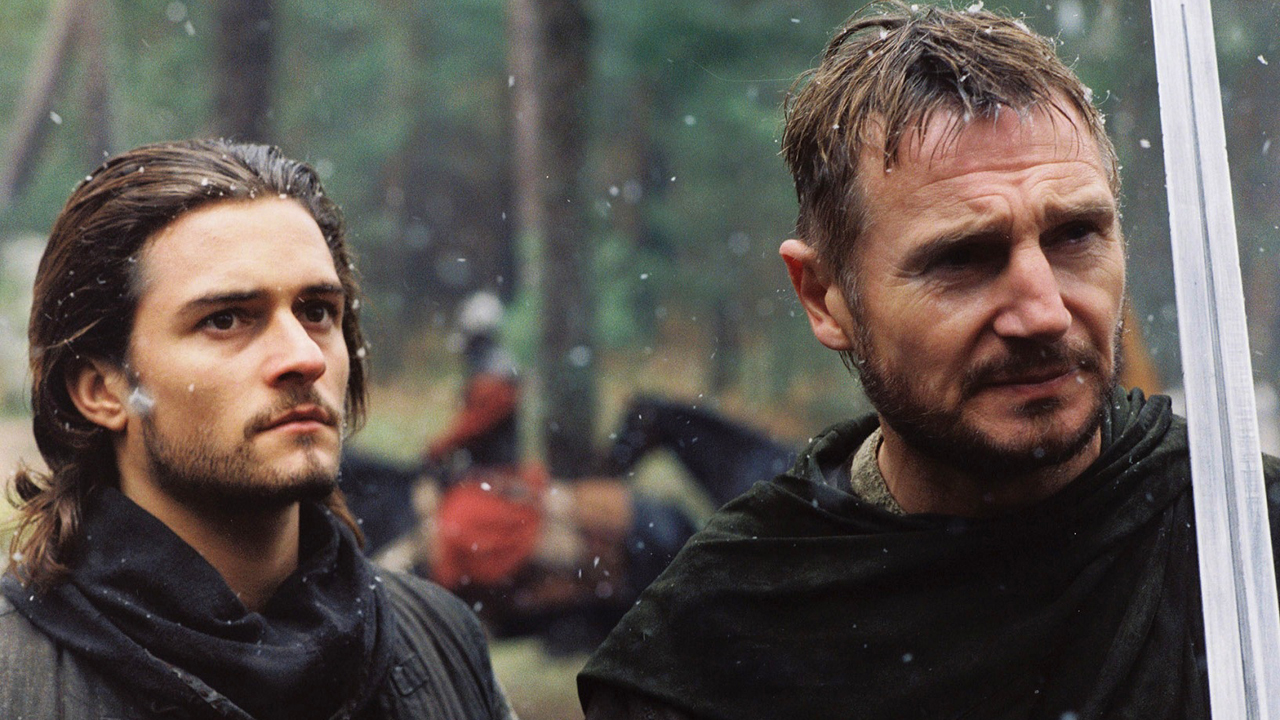
Back in 2005, 20th Century Fox released Ridley Scott’s much anticipated Crusades movie, Kingdom of Heaven, to lacklustre reviews and spiralling box-office receipts. Much of the criticism for the film ran in the direction of the narrative, which seemed flat, empty and devoid of a spark allowing the film to really fire up. Almost as if the film had been hamstrung after the fact. The cast couldn’t be faulted, not even the teen heartthrob Orlando Bloom, as all the screen performances were exceptional, it’s just that the film seemed a little…. awkward in it’s overall execution. Visually, as well, the film was stunning, making great use of the lavish location shooting, the amazing digital effects and the broad widescreen scope of the picture; you just got the feeling that the film was missing something.

According to Scott, who was particularly vocal upon the release of the film that he wasn’t entirely happy with what he had been asked to do by Fox to trim the film, he’d tried to make the film as financially viable as possible for cinema owners to show the film multiple times throughout the day, to make back their money. The film originally ran around two and a half hours, fairly lengthy for an epic film in this modern age of 90 minute movies. Fox were worried that a four hour mega-epic, which the original version had been, would be an insurmountable challenge for the studio to market and make money from, which was a considerable challenge, it must be said. Taking that into account, then, it’s easy to see why Scott was annoyed with the pressure he’d been placed under to produce a film that was manageable from a cinematic standpoint and a marketing strategy as well. And didn’t the critics give the film a pasting! When I initially viewed the film in the cinema, I too was left a little flat by the whole experience, I felt a little like I must have missed something, the film felt lumberous and turgid, with no real emotional heart (which was exactly what Scott had been worried about), and consequently, Fox deserved to take a drubbing in that regard.
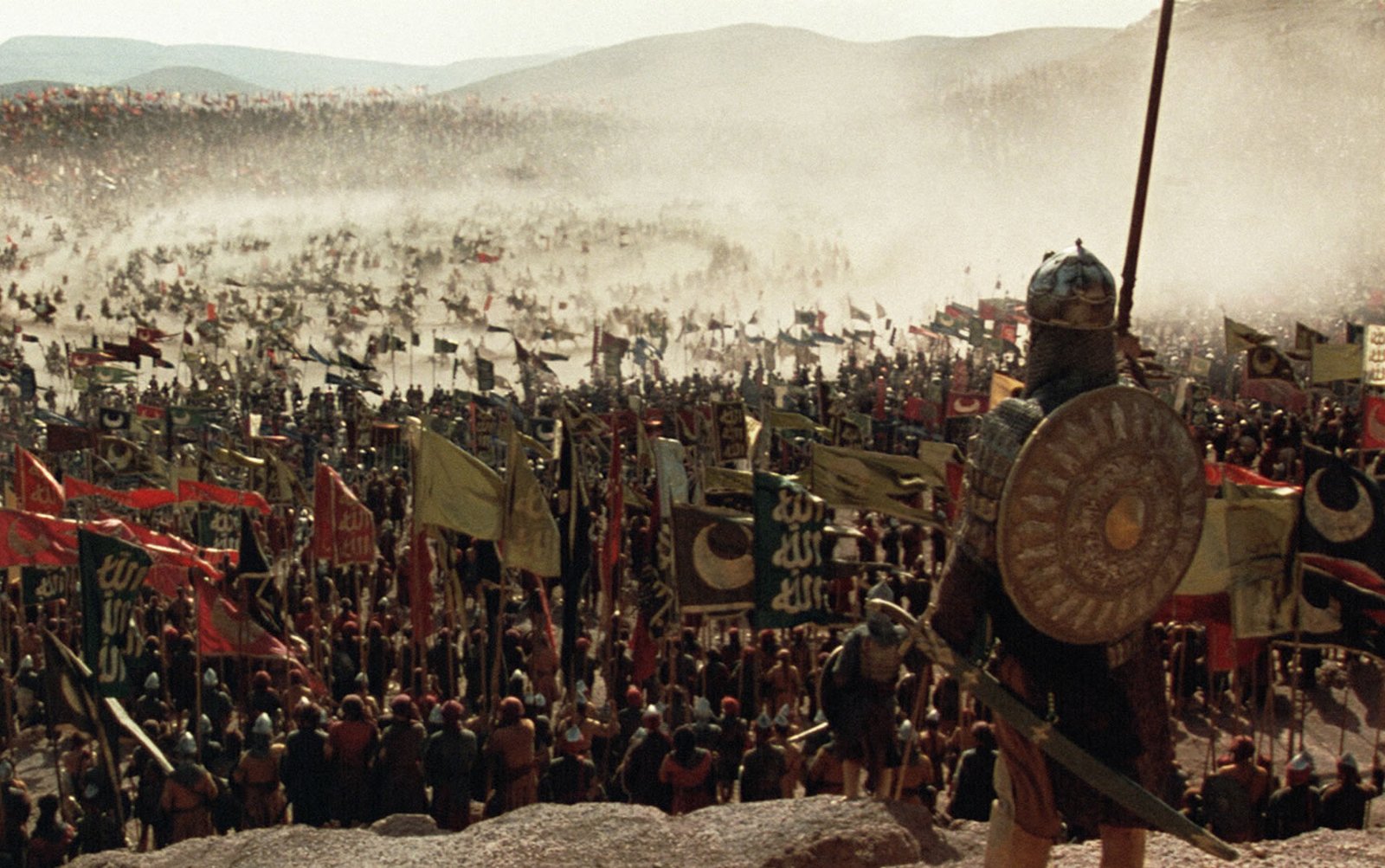
With the subsequent possibility of revisiting the film on DVD, Scott was afforded the luxury of releasing the film in the way he’d originally intended. And while many felt that the film was perhaps beyond salvation, upon it’s release it was felt my many in the industry that the Directors Cut of Kingdom Of Heaven was the version that should have been released in the first place, running time be damned. So it is with great pride that I present our review of the Directors Cut of this amazing film, because I am amongst the number who feel that way. The Directors Cut runs around 185 minutes (thanks to PAL speedup!) and presents the film in it’s roadshow format: an overture, an intermission, accompanying the film itself (be warned, the BluRay version does not include the Overture and Intermission, and so is slightly shorter) and is perhaps the best version of this film so far on digital format.
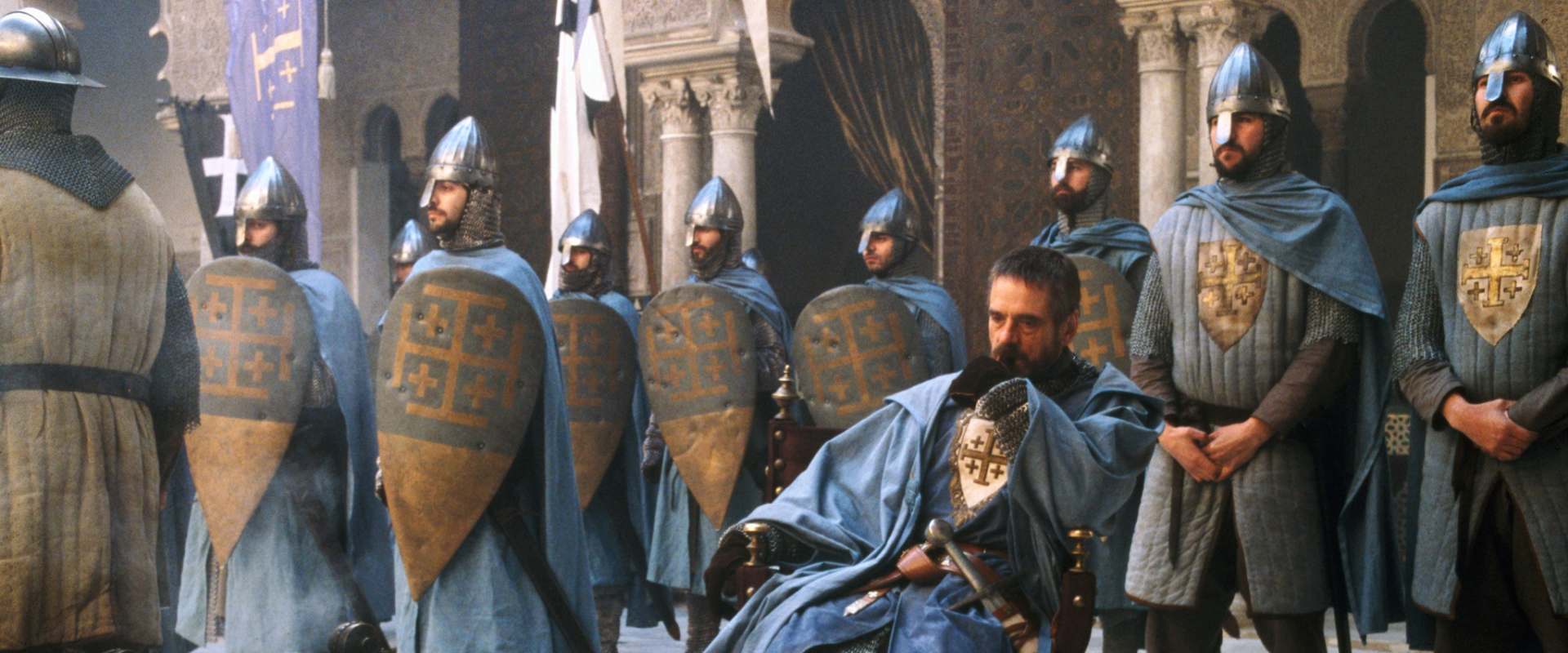
It is 12th Century France, and a young blacksmith, tormented by grief at the suicide death of his wife, and the conniving intent of his brother, finds his way into the path of his long lost father, Godfrey (Liam Neeson), which is embarking on one of the Crusades to defend the city of Jerusalem for the Christians, who are under increasing pressure from main foe Saladin, leader of the Muslims. The Crusades, for those who do not know their history, are not mysteriously missing adventures of Indiana Jones, but rather a series of militaristic religious campaigns by European kings to take control of the Holy Lands of what is now the Middle East. Information on the Crusades in detail can be found at the Wikipedia Article here. The central character, Balian, played by square-jawed, clear eyed poignancy by Orlando Bloom, was actually a real person, although this movie-fied version is, apparently, fairly far from who the real man actually was. Nevertheless, Ridley Scott and his screenwriter William Monoghan have crafted a sincere, respectful and balanced storyline, using both real and fictional characters (and combinations thereof) to create a world unlike any we’ve seen portrayed on screen before. From the hills of grey, depressing France (actually, shot in Spain) and the desert lands of what is now Israel (shot in Africa), to the magnificent city of Jerusalem and the siege it undergoes, Kingdom Of Heaven is replete with many of Scott’s trademark visual cues and flamboyancy, no matter how much he states otherwise.
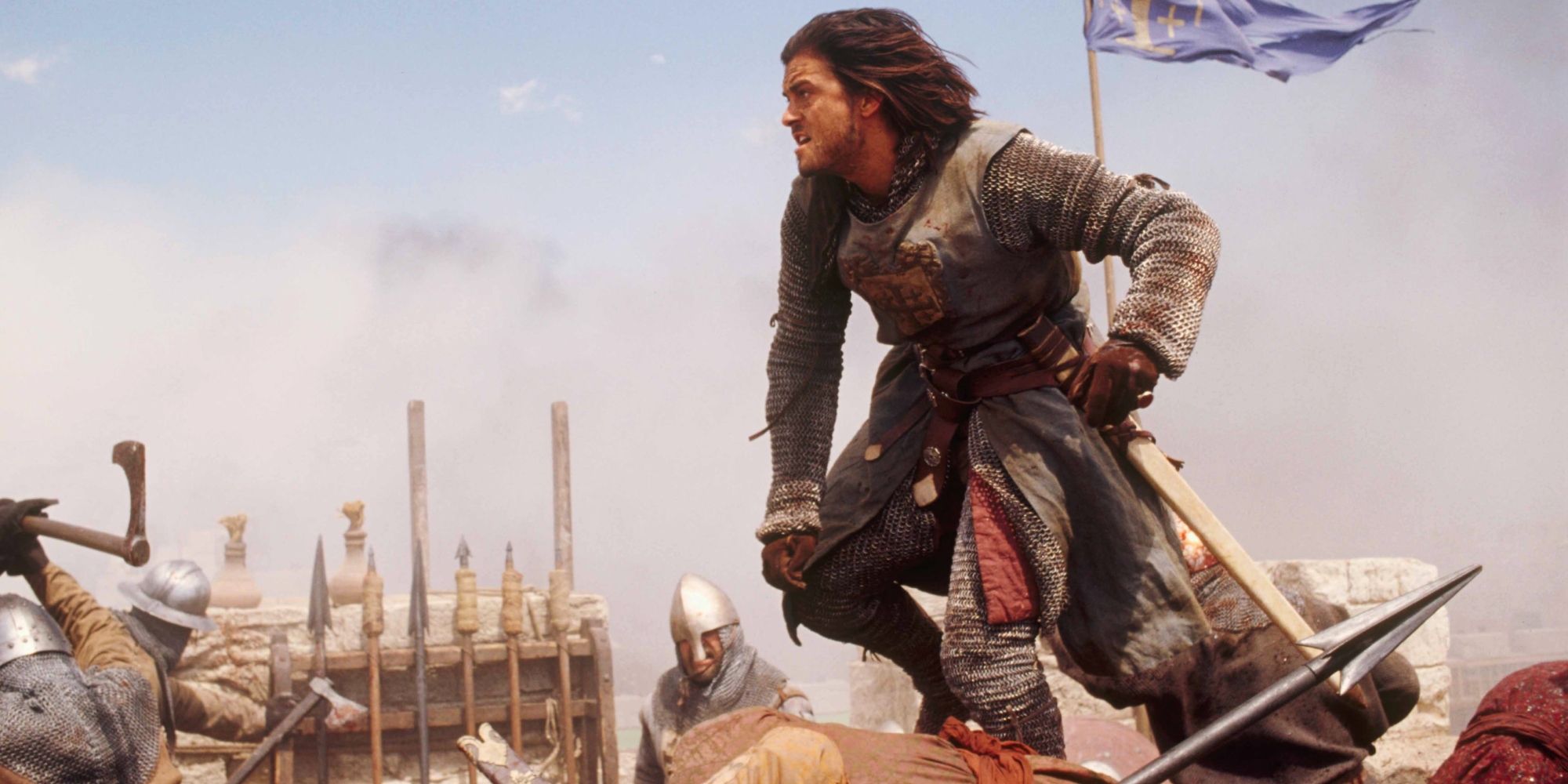
Balian travels with his father, Godfrey of Ibelin, to defend Jerusalem against the forces of Saladin (a wonderful American film debut for actor Ghassan Massoud) when they are attacked by soldiers who have come to arrest Balian for murdering his brother: something Balian admist to. Godfrey is seriously wounded, and cannot make it to the Holy Lands, and bequeaths his land and title to his son, who must continue on alone. Balian quickly makes an enemy of resident bad guy Guy of Lusignan (pronounced Gee) and a friend of Raymond, count of Tiberious. Guy is the commander of the Templar Knights, and husband to Sibylla, who is sister of King Baldwin of Jerusalem. Baldwin, played by a masked Edward Norton, is sufferring from what appears to be leprosy, a debilitating form of flesh rot that sees the victim die early in life. Guy (a wonderfully animalistic portrayal by Aussie Marton Csokas, whom most audiences will know from his role of Celeborn in Peter Jackson’s Lord Of The Rings Trilogy), violent and vindictive, has aspirations for the throne, which is why he has married Sybilla; for when Baldwin dies, he will assume control of the military and take on Saladin in full force. Raymond (Jeremy Irons), meanwhile, commands another religious force, the Knights Hospitaler, who are charged with the protection and care of the Holy Lands, and he is more placating to the various forces the surround this story, more content with the status quo than usurping control and power. You’d think that the Knight Templar and the Knights Hospitaler would be more interested in fighting for the same thing, however both orders have an uneasy truce, which constantly simmers underneath the main plot.
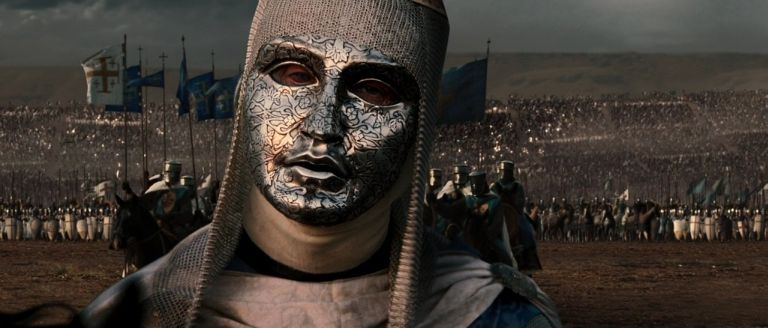
Balian comes into this trying to find himself, find a reason for his life, and subsequently becomes drawn into the remnants of his fathers life when he assumes control of his fathers Knights. He sides with Raymond, and has an affair with Sibylla (Eva Green), which only serves to infuriate Guy more. As the forces of Saladin approach, both the Muslim leader and Balian want peace, yet seem increasingly to despair of ever achieving it so long as the corrupt and power-mad Knights Templar continue to inflame the situation. Saladin wants his city back, after all, he sees the land as rightfully Muslim. Christians, it would seem, can have no claim to the site. Of course, the city is home to many of Christendom’s most holy places and relics, including the hill upon which Christ was crucified, which serves as a focal point early on in the story when Balian arrives in the city to ask God’s forgiveness and answer his questions.
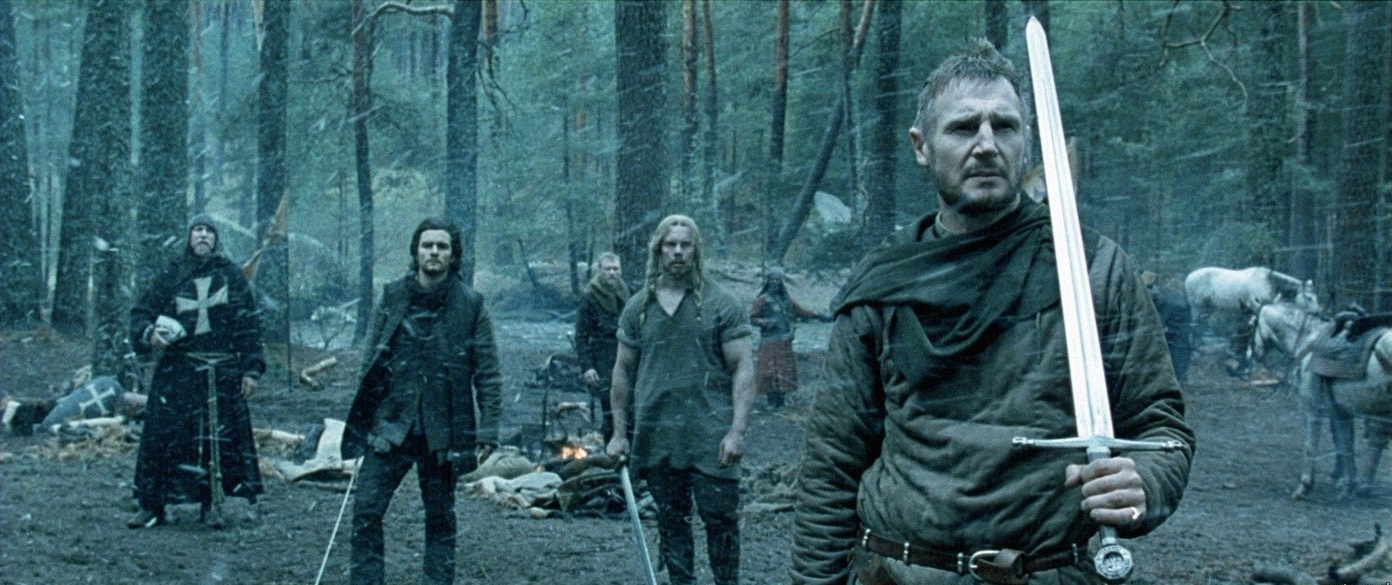
Sibylla has a son, whom she’s trying desperately to ensure will become the next ruler of Jerusalem instead of Guy, who has his own murderous intent for the youngling. Problem is, Guy is more than capable of killing the boy and assume the throne regardless, something Sibylla plays politics with to try and prevent. It’s here the story feels a little like the Lucilla/Lucius storyline in Gladiator, which is perhaps indicative of Ridleys’ seeming preoccupation of “innocence lost” narratives he imbues in his films. Nothing brings out audience empathy and hatred than somebody threatening to harm a child. The son storyline in Kingdom of Heaven was removed utterly from the theatrical release, and while it may seem to most to be a rather secondary and innocuous part of the film to remove (and perhaps, if you’d be more honest Rodney, the more logical part to remove if you had to) it’s here that the films’ overall heart and emotional weight seem to be centred. By returning this story to the film, Ridley Scott manages to achieve what critics derided the original version for in the first place: he gives the film an emotional weight that lifts it above mere mediocrity and into greatness.
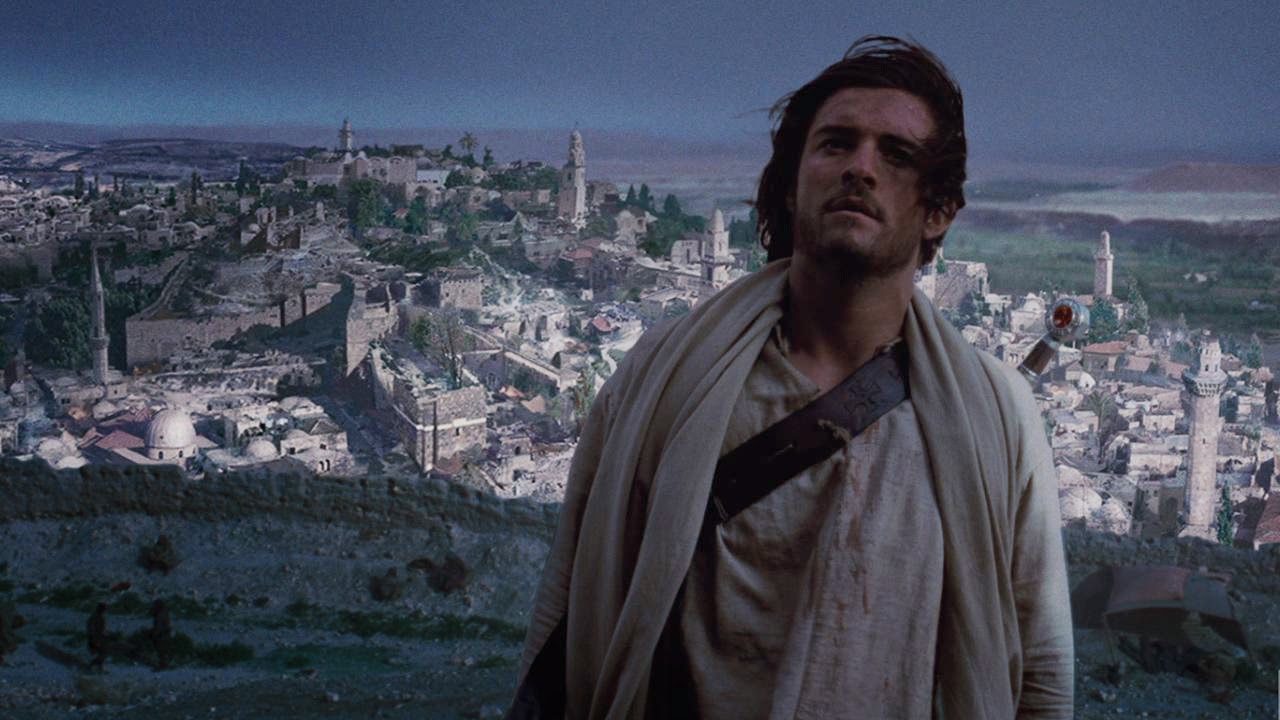
With both Christian Knights and Muslim soldiers intent on capturing (or keeping) the city, insanity seems to be the order of the day. Swathes of men, clouded in dust and flame, hurl themselves upon the battlements, sword and spear clashing with the claret-red blood spraying across the dry, dirty ground in a seemingly balletic display of metal and flesh. Trebuches swing boulders the size of houses at the city walls, the soldiers within becoming pulped or incinerated as both stone and flaming pitch is lobbed across the barrier. Bowmen sling their arrows as Saladins advancing army, yet cannot make much headway given the strategy and planning of Saladin and his enormous army. For you see, Saladin has both one enormous advantage, and disadvantage: on one hand he has the larger army to defeat the Knights within the city walls of Jerusalem, and on the other, he’s outside the walls of Jerusalem, trying to get in. The walls of Jerusalem are akin to those of Helm’s Deep from Lord Of The Rings: they pose no significant weakness to exploit (well, at least initially) and cannot be penetrated. Saladin’s forces rage against the fortress walls, and while the battle appears to be one-sided in favour of Balian and his Knights, soon Saladin’s meticulous planning allow him to force a kind of one-sided stalemate. Might seem a little contradictory to call it that, but that’s what it is.
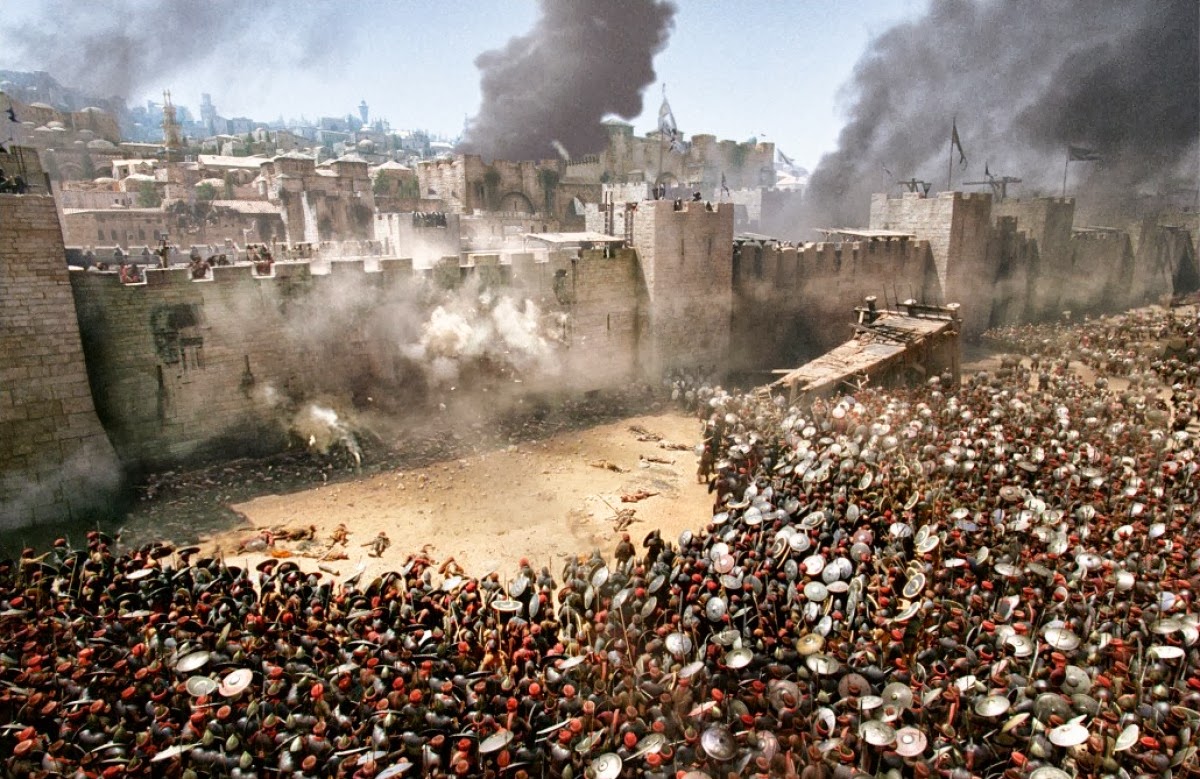
But what of Balian’s emotional journey? What of his path of self discovery? Well, Ridley fleshes this out as well, however, unlike the son of Sibylla storyline, it’s not by adding slabs of scenes into the film, but mostly rather by lengthening and tweaking existing sequences with removed footage, creating a more three-dimensional character and allowing the story to grow in it’s own way. Balian becomes a more sympathetic and heroic figure, a flawed, yet moral man, who tries to succeed, yet seems to be incapable of admitting that he is unable to hold the tide of history back on his own. Balian’s journey in the Directors’ Cut is more emotional, makes more sense narratively speaking, and has such dramatic weight that you really feel for the character by the end credits. Scott balances the emotional weight of the story with the enormous human scale of the epic battles and political narrative with a seeming ease, and this version of the film is sublimely more elegant and intellectual than the original.
Special mention must surely go to one of the best screen villains of recent times, that of Brendan Gleeson as Reynald, the vicious and bloodthirsty accomplice of Guy’s, who snarls his way across the screen in a bloody swagger and sneer: Gleeson is tremendous, and you can see him enjoying himself thoroughly.
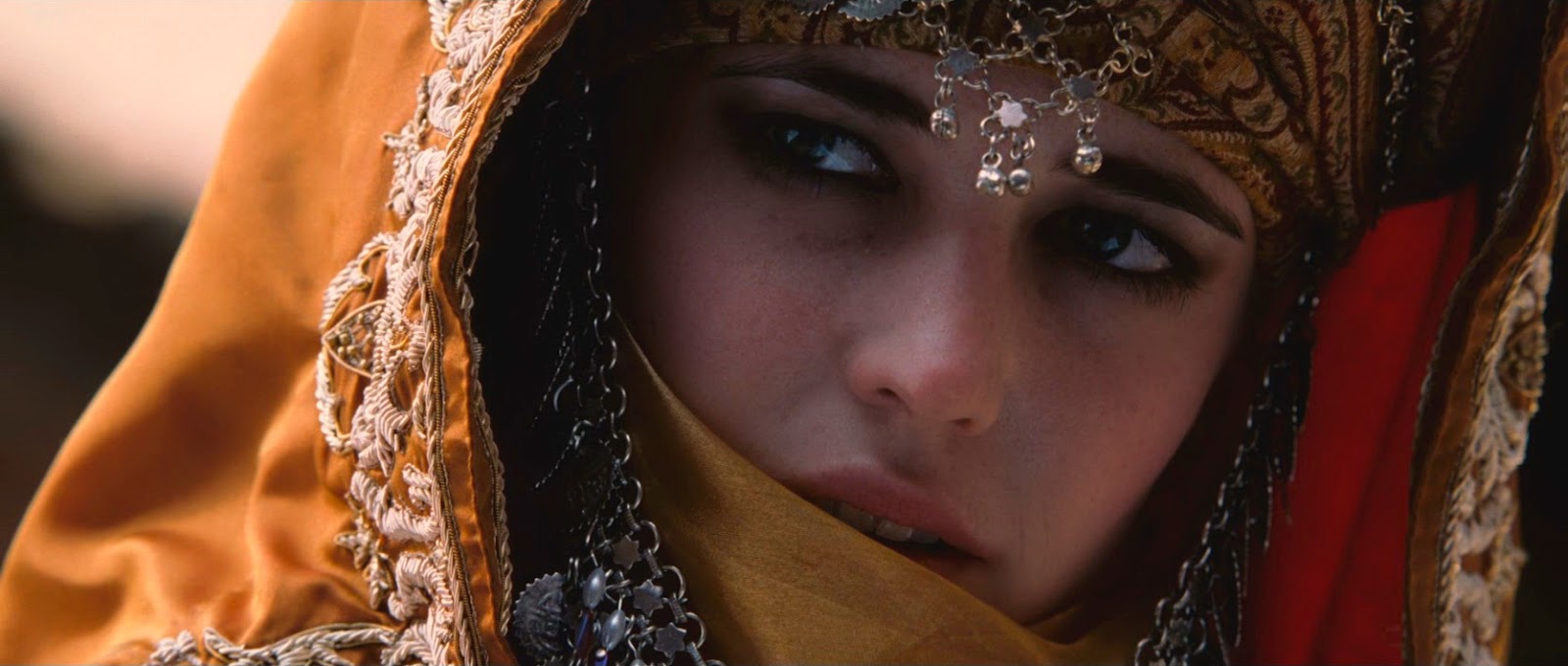
The film has some of the finest cinematography you’ll see in a Hollywood film, and with Ridley behind the camera, this is only to be expected. The blistering heat, the oppressive cold, the blood and dust, the ancient walls and peoples that inhabit the Holy Land: the film looks gorgeous. The special effects are minimal (where possible) of course, with Ridley trying his damnedest to ensure he uses as much live action material as possible before relying on computers to tell this story. Large wide shots filled with staggeringly enormous armies swarm like ants across the desert sand, the trebuchets and bombardiers advancing upon the city walls filled with people: both intimate and extravagant, Kingdom Of Heaven looks immaculate.
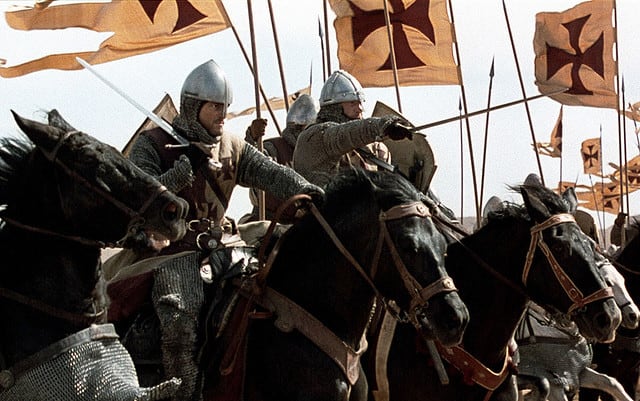
However, there’s one facet of this film that I think, in today’s political and international climate, makes a very good argument about war and insanity. A lot of people were upset with Ridley Scott’s portrayal of Muslims in the film. There are those who saw Scott as either pandering to political correctness, or subverting historical fact as Hollywood fictionalisation, in order to tell the story he wanted to. It has been insinuated that Ridley Scotts portrayal of the Muslim armies in the film is lopsided and unfair, a generalisation upon a great race of people and religious denomination: honestly folks, the Christians in the film tend to act a lot more selfishly and obscenely than the Muslim armies of Saladin. While getting into a religious debate over which faith is better (best left for other, more intelligent people!) it’s easy to see why this film would have caused some conflagrations within the audience. It’s a decidedly modern story, told in an ancient context, yet still manages to keep it’s relevance better than any other film of it’s type yet made. Scott has crafted a story of two opposing forces (and they could have been any forces, not merely Christian and Muslim) and personally, I think the idea is simply to promote peace: war and conflict solves nothing, and in the case of the Middle East, has merely served to keep the inflammatory zealots in employment. While a paradigm of the modern and the past keep cropping up, and the film is eerily similar to the kinds of thing’s happening in the region currently, Kingdom Of Heaven is a story of hope, of peace and understanding that, while perhaps not achievable in every way today, is something we should strive for each day, in order to make our world just that little bit better.
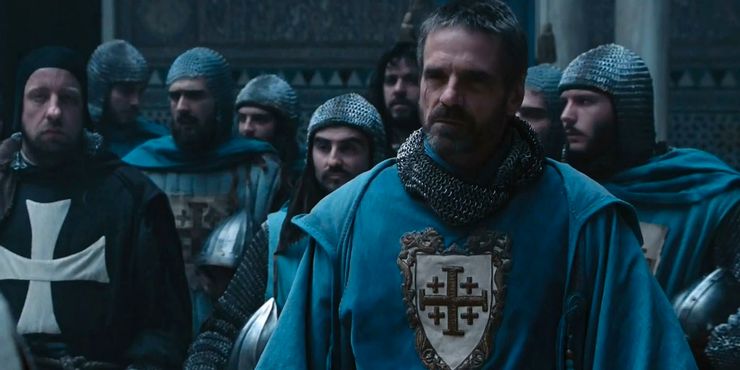
For those who look at Kingdom Of Heaven as an abject failure from one of cinema’s true modern luminaries, and if you were amongst the many who thought the film sucked big-time, then can I urge you to revisit the longer version and reappraise your summation of this great film event. Fictionalised or not, the unrest in the Middle East cannot help but be great story material for cinema, as either a morality fable to teach us more about ourselves, or simply as a diatribe on the futility of war and terror. Kingdom Of Heaven: The Director’s Cut, is a magnificent story and cinematic journey, and unlike the original version released to cinemas across the world (gee, thanks Fox!) is a superior masterpiece from a man whom I consider to be one of the artforms’ great showmen.

Infidels will be infidels
Of course they will…. whatever that means.
Um,..the author says here that some thought this lopsided about Muslims.Well,..the thing is,it was mostly a true story.Including the part where Saladin gives a cup of wine to Guy,and he gives it to Reynald,who drinks from it.Saladin says "I didnt give the cup to you".Reynald replies "I know",and then is promptly sliced up by Saladin. This really happened. It wasnt political correctness that Ridley was after,it was his attempt to tell a story in the truest manner he could,allowing all the constrictions he was faced with.I loved this film in it's theatrical version,and even more so with the Directors Cut.Just a perfect movie in all ways.
Oh,and I was absolutely captivated by Ghassan Massoud as Saladin. Absolutely. You should read the interviews with him about Saladin.Extremely interesting how he came about presenting Saladin.He wanted to be as close to what the real Salahudin(Saladin) was like.Kudos to him for such meticulous work.
i'm gonna have to give this one a shot…and maybe even stay awake through it this time!
Interesting that the DVD would be better than the movie and that the director wasn't able to have enough influence on the editing to get his version out there.
Superbly written review, as per usual. No wonder the cinema world wants you to sleep with their starlettes—uhm, judge their festivals.
LOL!!!!! Yeah, I'm a regular Hollywood lothario – I mean man about town – I mean, judge.